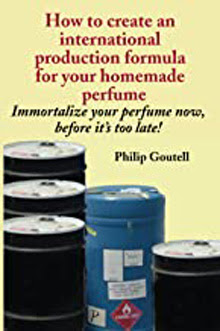This is a continuation of a series of articles on producing a fragrance -- for profit -- with production limited to 12 bottles ("60" is when you start to grow!) Prior blogs: 12 to 60: Building a profitable perfume business, a few bottles at a time and 12 to 60: Planning your 12 bottle perfume launch.
Having covered bottles, pumps, and labels it's time to get to the heart of the matter, the fragrance itself -- the magical fluid that goes into the bottle and makes a sale possible. That magic liquid is composed of three components: fragrance oil (the "juice"), alcohol, and water. On a bottle you may see these ingredients listed as "fragrance, SD alcohol, DI water." Today I want to write about water, a topic easily overlooked and greatly misunderstood.
The water can be left off. You can make your perfume without it. That would leave you with just the fragrance oil and alcohol. The issues with water are "why?, "what kind?", and "how much?" Let's start with the easy question: "how much?"
The starting point for our exploration of water is the alcohol for your perfume because the water in your perfume comes with the alcohol. Our starting point is pure, 100% ethanol -- 200 proof alcohol.
But 200 proof alcohol has no water in it. If we want water, we have to add it. How much? I typically "water down" my alcohol to 180 proof -- 90% ethanol and 10% water -- by volume. 190 proof is also common for perfumery, 95% alcohol, 5% water -- by volume.
So my answer to the first question, "how much?" is ten percent or less by volume, the balance being pure ethanol. Products sold as "perfumers alcohol" are generally not pure, 100% ethanol so be aware of this.
Since these measurements are by volume, it's easy to do your blending. Say you want a liter of 180 proof alcohol, 90% ethanol and 10% water. Start with a 1000 ml (l liter) measuring cup. Fill it to the 100 ml mark with water. Then top it up to the 1000 ml mark with 900 ml of alcohol. Then be sure to store it in a clean bottle with a stopper to prevent evaporation. And be sure to label it for what it for what you made: 180 proof alcohol: 90% alcohol, 10% water.
As for the question, "what kind of water?" the answer is de-ionized water, which is not the same as distilled water. Both distilled water and de-ionized water are high in purity. Much of the purity is the result of pre-treatments through filtration before each is subjected to its final process.
Distilled water is produced by distillation, the same process used to make moonshine. The water is boiled, steam rises, goes through a condenser -- the cooling tube or tower -- and becomes liquid water again leaving behind various minerals.
Even if you don't have distilling equipment you can witness this process on your kitchen stove. Boil a small pot of water until steam is released, hold a place in the path of the steam (watch your fingers, the steam is hot!) and you'll see droplets of water form on the bottom of the plate and then fall back into the pot. If you let all the water boil off, you will see a residue left on the pot. This residue is some of what your distillation process has removed from your water.
One small problem for perfumery with distilled water. If your water contains organic materials with the same boiling point as the water, they will join the steam and end up on in your newly distilled water. For the home perfumer this may not seem like a big deal, but why cut corners?
De-ionized water is water from which all ions have been removed. This can be done in several ways but the result is water that, chemically, is a "blank slate." It won't react with your fragrance oil. It won't change the odor, it won't change the color. It is the preferred water for perfumery. It is not expensive. You can buy it in small quantities. I've listed some sources here.
Now, to the question, "why use any water at all?" I've written about this elsewhere but it comes down to these three points. Water softens the alcohol so it is softer on the skin. Water clings to the top notes and gives them a persistence that they would not have otherwise. And, in a spray, water intensified the effect of the perfume.
Now you have it. A better understanding of water. The next issue I'll tackle will be alcohol, what kind you want and where you can get it.
Friday, March 24, 2017
Subscribe to:
Post Comments (Atom)


I haven't experiment yet but lack a few ingredients. I have fragrance oil essential oil raw oils n perfumer alcohol. Do I need still need to add distilled water?
ReplyDeleteNo. Water is not essential. But if you want to get experimental, you can try it with and without. Good luck with it! -- Phil
DeleteThis is interesting. I do skin care formulations and I'm wondering if the processes are similar as I measure in grams and use percents. They always add up to 100% Would it be possible to use Food grade Alcohol from sugar cane that's 190 instead of perfumers alcohol?
ReplyDeleteThe alcohol should work without a problem but be aware of the tax consequences and the reason "specially denatured alcohol" exists.
DeleteWhat sort of Alcohol do I use ?
ReplyDeleteTypically SD-40B.
Delete